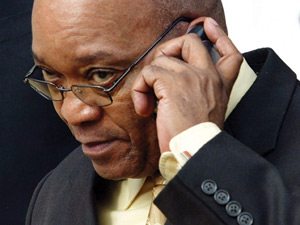
[miningmx.com] – IN A rare but welcome intervention in the mines wages debate, South African president, Jacob Zuma, has called on traditional leaders to pare the expectations of mineworkers, or risk wrecking the country’s economy.
News wire service, Sapa, quoted Zuma in a speech in the House of Traditional Leaders as calling for its members to help workers understand the consequences of demanding high increases in wages. Excessive wage demands would result in civil strife and job losses, he said.
“If the workers demand higher wages and that becomes a point of conflict, so sharp a conflict it could produce another Marikana, then there’s something wrong in our society”.
Zuma’s comments come only days after Gwede Mantashe, secretary-general of the ANC, said rival unions the National Union of Mineworkers (NUM) and the Associated Mineworkers & Construction Union (Amcu) must abide by the rules when recruiting new members.
“With the rivalry of the unions in the Rustenburg area and in the mining industry, we have a principle in that matter,” Mantashe said. “We don’t think employers should be biased in favour of NUM over Amcu. What we are saying is that in any area where there is more than one union in a company, all of them must play according to rules.”
Placed side-by-side, the comments of the ANC’s most senior politicians suggests that the South African government has woken to the problems posed by the prospect of mines strikes over the next few months, not least because it is reflected in the value of the rand which today recorded its 11th straight loss against the dollar.
Said Zuma: “The tension in the industry will not help the economy…. We could impoverish our country. That’s why the leaders ought to engage workers, so that workers understand exactly what are the consequences of their actions.
“I’m not saying workers must not strike. That is a right that is enshrined in the Constitution. The question is how do you do it? Do we do it to make others lose their jobs, or do we do it so that others can get more jobs?”
Zuma’s comments come a week after Joseph Mathunjwa, president of Amcu threatened to march to the Union Buildings in an act that would bring the economy to a standstill.
“We will march to the Union Buildings and we are going to exercise our rights and (tell) the president that we are sick and tired of this union bashing and killings taking place in Rustenburg,’ said Mathunjwa to workers at Lonmin’s Karee section.
Zuma, however, warned that wildcat strikes did not advance the interest of marginalised people in South African society.
“Wildcat strikes of the type happening in the mining industry and other sectors are hardly the way to advance the interests of marginalised sections of our people in a democratic dispensation such as we have,” Sapa quoted him to have said.
“We should demand better salaries and working conditions, but we may not wreck the economy.” Zuma even spoke for mining company shareholders saying they took their investment decisions based on perception, not fact.
Zuma’s remarks are timely as the NUM and Amcu are only weeks away from opening wage discussions with employers in the gold, platinum and coal sectors.
In a note today, Justin Froneman, an analyst for Standard Bank Group Securities, observed that a feature of strike activity in South Africa was that one occurence normally spurred another like “a Mexican wave”. Only a move towards collective or centralised bargaining would solve the problem.
“From this perspective, the South African government has an important role to play in facilitating this process, in our view,” said Froneman, who added that strike activity in South Africa this winter was likely to be frequent but short in duration.
“While the restructuring at Anglo Platinum remains to play out, we believe that there is little incentive from either labour or their unions to delay the unavoidable,” he said.










